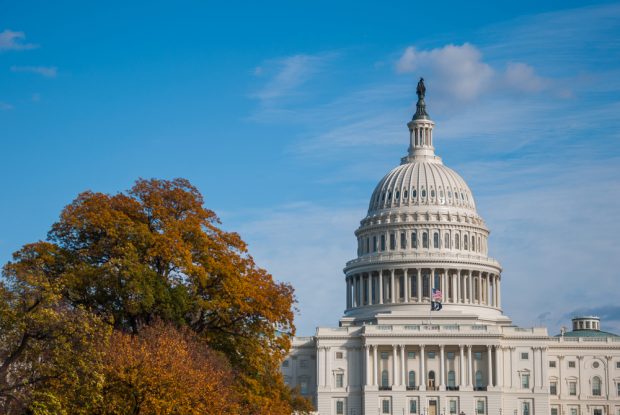 United States Capitol Building, Washington D.C. (Source: Shutterstock)
United States Capitol Building, Washington D.C. (Source: Shutterstock)
The NCUA should avoid charging federally-insured credit unions a premium to restore the agency's equity ratio, but the agency could take other steps if a "restoration" is needed, NAFCU Vice President of Research and Chief Economist Curt Long said Tuesday.
"In lieu of imposing a premium, NAFCU supports the NCUA adopting or supporting relief measures to provide credit unions with more options to manage the large influx of deposits, including additional temporary investment authorities," he wrote in a letter to the agency board.
Recommended For You
NCUA officials told the agency board last week that at the end of June, the equity ratio stood at 1.22% – close to the 1.20% that would require the agency to develop a formal restoration plan.
The ratio has dropped 13 basis points since the end of 2019, largely because of a huge influx of insured deposits. That influx was the result of the coronavirus, agency CFO Eugene Scheid told the board. Federal law allows the agency to charge credit unions a premium once the equity ratio dips below 1.30%.
The agency's Normal Operating Level is 1.38%.
Board members appeared reluctant to charge the premium, particularly since regularly scheduled payments by credit unions are likely to increase the equity ratio.
"A decline which results from uniquely high share growth is fundamentally different from one which results from higher losses or reserve expenses," Long wrote.
CUNA officials also have said they oppose charging credit unions a premium.
In his letter, Long outlined options for the board to consider.
The agency could temporarily allow credit unions to make additional investments. He said, for example, credit unions are not permitted to invest in asset-based securities, but CUSOs are.
He added that federal credit unions are not explicitly allowed to invest in corporate bonds, but some state laws permit state-chartered credit unions to do so.
"Considering the current economic circumstances, the NCUA should determine that a credit union may temporarily engage in additional investments that share a rational nexus to those explicitly outlined in the FCU Act, do not pose more risk than those activities explicitly authorized by the FCU Act, and are essential to carrying on the credit union's operations," Long said.
Long said when the agency merged its Temporary Corporate Credit Union Stabilization Fund with the Share Insurance Fund, credit unions received a premium that they likely used for purposes other than increasing their net worth.
For example, he said, some of that amount likely was used to invest in cybersecurity and financial technology.
"As the NCUA has acknowledged, cybersecurity is a particularly costly investment, but a critical one for the industry to undertake," he wrote.
Investments in technology may have enhanced the overall safety and soundness of the credit union system, he noted.
© Touchpoint Markets, All Rights Reserved. Request academic re-use from www.copyright.com. All other uses, submit a request to [email protected]. For more inforrmation visit Asset & Logo Licensing.






